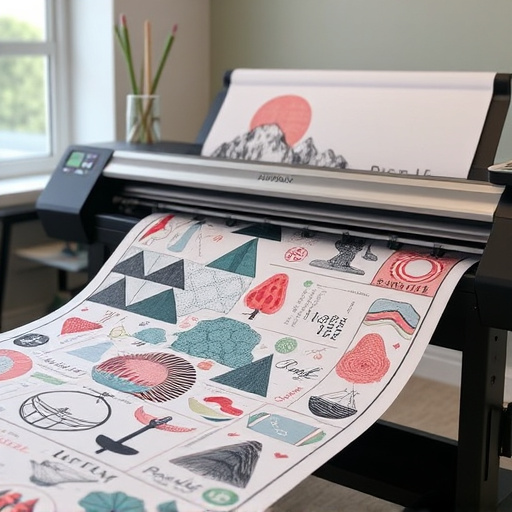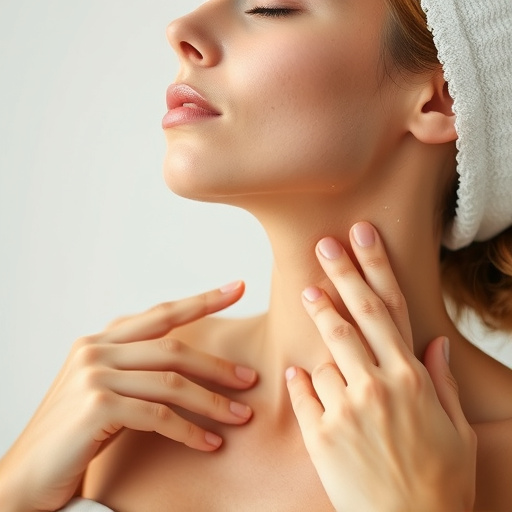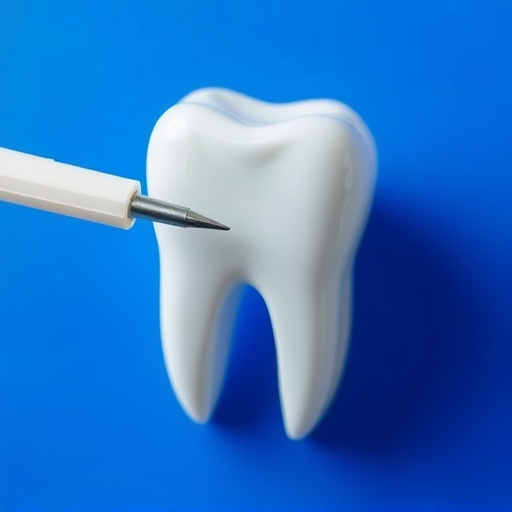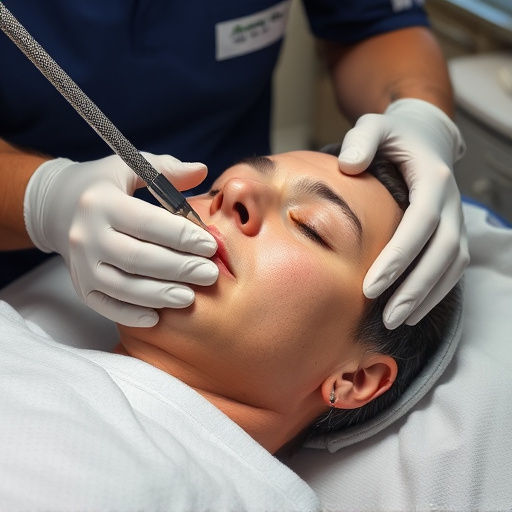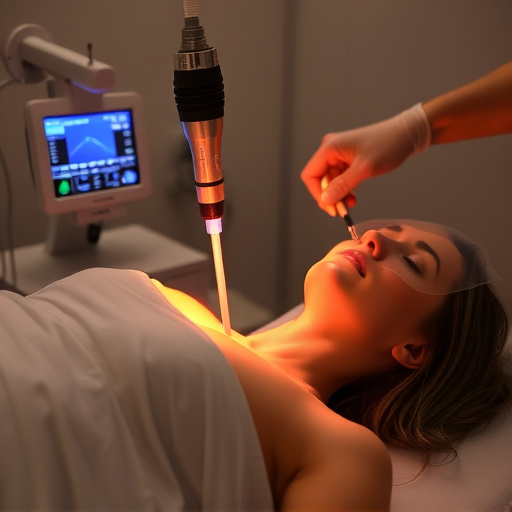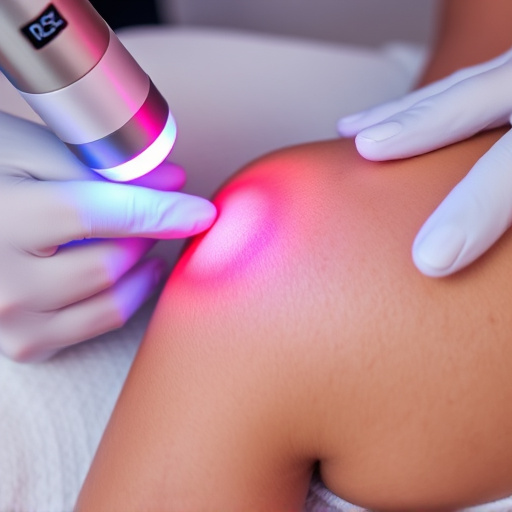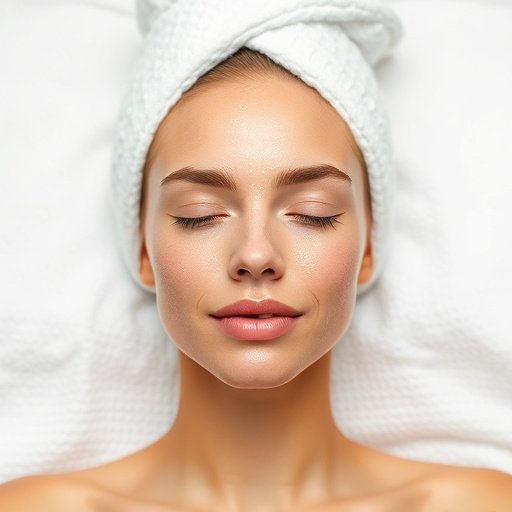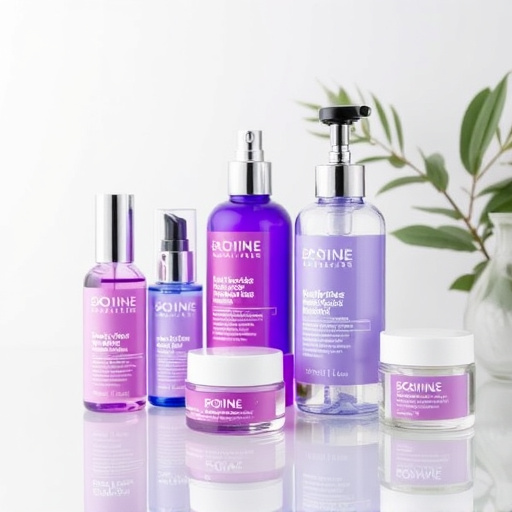Acne scar treatment combines at-home care with professional procedures to address damaged collagen and elastin fibers. Key methods include microneedling for stimulating collagen production, and hydrating facials to restore moisture for natural collagen generation. Customized facials and topical treatments like retinoids and vitamin C serums also enhance skin texture and tone, aiming for clearer, smoother, scar-free skin through a holistic approach.
Acne scars can leave lasting marks on the skin, but innovative treatments are revolutionizing skincare. This article explores effective strategies to combat acne scars by boosting collagen production, the essential protein for healthy, youthful skin. We delve into the science behind collagen and its critical role in healing and regenerating skin. From topical creams to intracutaneous therapies, discover the latest techniques that promise smoother, clearer skin, offering hope and a roadmap for those seeking lasting solutions for acne scar treatment.
- Understanding Acne Scars and Collagen: The Foundation of Healthy Skin
- Innovative Treatments for Acne Scar Reduction: A Focus on Boosting Collagen Production
- Topical and Intracutaneous Approaches to Achieving Smooth, Clear Skin: A Comprehensive Look
Understanding Acne Scars and Collagen: The Foundation of Healthy Skin

Acne scars can be a persistent reminder of past skin issues, leaving behind depressions or raised areas on the skin’s surface. These scars form when inflammation damages the collagen and elastin fibres, which are essential for skin elasticity and structure. Collagen is the foundation of healthy, youthful-looking skin, providing strength and flexibility. When production is disrupted, as in the case of severe acne, the skin may struggle to heal properly, resulting in scarring.
Understanding this relationship between collagen and acne scars is key when considering effective treatments. Some procedures, like microneedling therapy, stimulate collagen production by creating tiny channels in the skin, encouraging cell renewal and enhancing elasticity. Other aesthetic treatments, such as hydrating facials, can help restore moisture levels, supporting the natural collagen generation process. By targeting both the scarring and the underlying factors, these treatments offer a holistic approach to achieving clearer, smoother skin.
Innovative Treatments for Acne Scar Reduction: A Focus on Boosting Collagen Production

In the quest for achieving flawless, scar-free skin, innovative acne scar treatment options have emerged as game-changers in the aesthetic world. Among these advancements, a significant focus has been placed on stimulating collagen production—a natural protein essential for maintaining and repairing skin tissue. Collagen acts as the building block of healthy skin, providing structure and elasticity, which makes it a crucial target for effective acne scar reduction.
Modern approaches to acne scar treatment go beyond traditional methods with an emphasis on non-surgical treatments. Customized facials, for instance, offer targeted interventions by combining active ingredients and techniques to boost collagen synthesis. These treatments not only help in reducing the appearance of scars but also enhance overall skin texture and tone, leading to a more youthful and radiant complexion. Such innovative aesthetic treatments are revolutionizing skincare routines, providing individuals with effective and accessible options to achieve desirable skin results.
Topical and Intracutaneous Approaches to Achieving Smooth, Clear Skin: A Comprehensive Look

Acne scar treatment goes beyond surface-level solutions. It involves a combination of topical and intracutaneous approaches to achieve smooth, clear skin. Topical treatments, such as creams and serums containing retinoids or vitamin C, can help stimulate collagen production and gradually fade scars. These products are easily accessible and offer a gentle, at-home option for ongoing care.
For more advanced cases, intracutaneous procedures like chemical peels and microneedling therapy prove effective. Chemical peels use concentrated acids to exfoliate the skin, revealing smoother, more even layers beneath. Microneedling, on the other hand, involves pricking the skin with tiny needles to prompt a healing response that boosts collagen production. These methods offer more significant results but require professional application and may carry mild side effects.
Acne scars can significantly impact one’s skin confidence, but innovative treatments focusing on collagen production offer hope for achieving smooth, clear skin. By understanding the role of collagen in healthy skin and exploring both topical and intracutaneous approaches, individuals can find effective solutions to reduce the appearance of acne scars. These advanced treatments hold the promise of a more vibrant and even complexion, providing a lasting testament to the power of boosting natural collagen production for optimal skin health.
